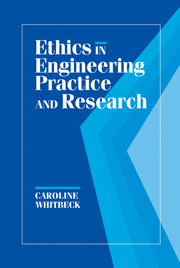Book contents
- Frontmatter
- Contents
- Preface
- Foreword
- INTRODUCTION TO ETHICAL CONCEPTS
- 1 ETHICS AS DESIGN: DOING JUSTICE TO ETHICAL PROBLEMS
- 2 THE BASIS AND SCOPE OF PROFESSIONAL RESPONSIBILITY
- 3 CENTRAL PROFESSIONAL RESPONSIBILITIES OF ENGINEERS
- 4 TWO MODELS OF PROFESSIONAL BEHAVIOR: ROGER BOISJOLY AND THE CHALLENGER, WILLIAM LEMESSURIER'S FIFTY-NINE STORY CRISIS
- 5 WORKPLACE RIGHTS AND RESPONSIBILITIES
- 6 RESPONSIBILITY FOR RESEARCH INTEGRITY
- 7 THE RESPONSIBILITY OF INVESTIGATORS FOR EXPERIMENTAL SUBJECTS
- 8 RESPONSIBILITY FOR THE ENVIRONMENT
- 9 FAIR CREDIT IN RESEARCH AND PUBLICATION
- 10 CREDIT AND INTELLECTUAL PROPERTY IN ENGINEERING PRACTICE
- EPILOG: MAKING A LIFE IN ENGINEERING AND SCIENCE
- Bibliography and References
- Index
8 - RESPONSIBILITY FOR THE ENVIRONMENT
Published online by Cambridge University Press: 05 June 2012
- Frontmatter
- Contents
- Preface
- Foreword
- INTRODUCTION TO ETHICAL CONCEPTS
- 1 ETHICS AS DESIGN: DOING JUSTICE TO ETHICAL PROBLEMS
- 2 THE BASIS AND SCOPE OF PROFESSIONAL RESPONSIBILITY
- 3 CENTRAL PROFESSIONAL RESPONSIBILITIES OF ENGINEERS
- 4 TWO MODELS OF PROFESSIONAL BEHAVIOR: ROGER BOISJOLY AND THE CHALLENGER, WILLIAM LEMESSURIER'S FIFTY-NINE STORY CRISIS
- 5 WORKPLACE RIGHTS AND RESPONSIBILITIES
- 6 RESPONSIBILITY FOR RESEARCH INTEGRITY
- 7 THE RESPONSIBILITY OF INVESTIGATORS FOR EXPERIMENTAL SUBJECTS
- 8 RESPONSIBILITY FOR THE ENVIRONMENT
- 9 FAIR CREDIT IN RESEARCH AND PUBLICATION
- 10 CREDIT AND INTELLECTUAL PROPERTY IN ENGINEERING PRACTICE
- EPILOG: MAKING A LIFE IN ENGINEERING AND SCIENCE
- Bibliography and References
- Index
Summary
SUSPECTED HAZARDOUS WASTE
You are an engineering student employed for the summer by a consulting environmental engineering firm. R. J., the engineer who supervises you, directs you to sample the contents of drums located on the property of a client. The look and smell of the drums and samples leads you to believe that analysis of the sample will show it to be hazardous waste. You know that if the material contains hazardous waste, there are legal restrictions on the transport and disposal of the drums that will apply and that federal and state authorities must be notified.
When you inform R. J. of the likely contents of the drums, R. J. proposes to “do the client a favor” – document only that samples have been taken and not proceed with the analysis. R. J. further proposes to tell the client where the drums are located, that they contain “questionable material,” and to suggest that they be removed.
Why does R. J. think that incomplete information will be “a favor” to the client?
Is giving incomplete information responsible engineering practice?
Does the law in your state require engineering firms to report any release of hazardous waste to the state's department of environmental protection?
What, if anything, could you do, as a student and a summer hire?
COMPLYING WITH POORLY WRITTEN ENVIRONMENTAL LAWS
You are an environmental engineer working for a manufacturing company that makes computer components.
Information
- Type
- Chapter
- Information
- Ethics in Engineering Practice and Research , pp. 236 - 262Publisher: Cambridge University PressPrint publication year: 1998
